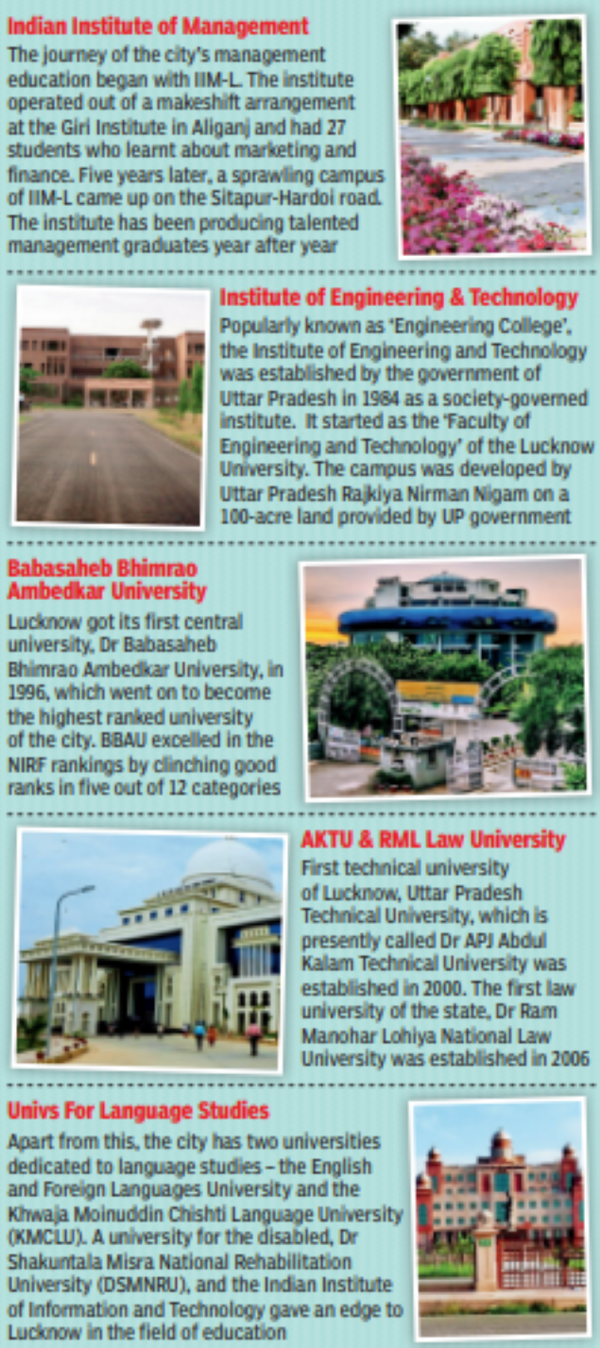Though Lucknow has always been a prominent centre of quality education with several schools and colleges of international repute, the past four decades made the state capital a hub of education.

Till 1983, Lucknow had only one state university, nearly 20 government-aided degree colleges, a government polytechnic, and a college of architecture and fine arts. After four decades, Lucknow has added 11 private and public universities, around 200 degree colleges, and prestigious engineering and management institutes.
Since its inception in October 1983, the Lucknow edition of The Times of India has not only reported on the growth of the education sector but also closely followed the challenges and journey of educational institutes.
“You will not find a single city in North India, except Lucknow, which has a law university, a university for the disabled, a technical university, an Indian Institute of Management, an institute of information technology and two universities dedicated to study and research in Indian and foreign languages,” says former vice-chancellor of the Ram Manohar Lohiya National Law University (RMLNLU), Prof SK Bhatnagar, who has also held key posts in the Babasaheb Bhimrao Ambedkar University (BBAU).

“Lucknow got its first Central University in 1996 in the form of BBAU. It was conceived as a premier institution to carry out pioneering work in key and frontier areas of science and technology and promote explorative studies in Ambedkarite ideology.
Around a decade later RMLNLU was founded which carved out its niche in judicial circles by producing judges not only for Uttar Pradesh but for adjoining states too,” he adds. “A number of its alumni have gone to reputed universities of the world for higher studies, and many of them have been offered fellowships.
Its alumni are also active in other legal fields like litigation, teaching, and working for NGOs and corporate houses in India and abroad. The percentage of girl students is quite high as compared to other law colleges/faculties in Lucknow,” Prof Bhatnagar remarks.
Moulindo Mishra, who has served as a faculty member in the physics department at one of the oldest colleges of the city, the Lucknow Christian College, says that after 40 years, the city has 10 universities – five government and as many private institutes.
“Lucknow is a place that is not only rich in academic diversity. The Lucknow University offers courses in rarest of rare subjects like astronomy, Jyotirvigyan, gemology, acharya, and Persian. Lucknow’s five governmentrun universities include a central university, a law university and three state universities.
Besides, the city has an IIM, an English and foreign language university and an IIIT,” says Mishra, who has also served as the former president of the Lucknow University Associated College Teachers’ Association (LUACTA).
“I remember that a few months after TOI was started in Lucknow, India’s fourth IIM was opened in the city in 1984. The Institute of Engineering and Technology (IET) also came into existence the same year,” says Mishra.
While the existing universities and colleges continued to upgrade infrastructure and took steps to improve the facilities and quality of education, several new ones gave the students a plethora of options.
The oldest university of the city, Lucknow University, which had only 14 affiliated colleges till 1983 now has 180 affiliated colleges in Lucknow district and total 556 affiliated colleges in Lucknow, Hardoi, Lakhimpur Kheri and Sitapur districts.
Source link
credite

